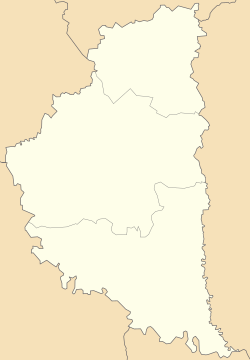Kozova (Ukrainian: Козова; Polish: Kozowa; Russian: Козо́ва) is a rural settlement in Ternopil Raion, Ternopil Oblast, western Ukraine. It is located in the historical region of Galicia, 16 km (10 mi) east of Berezhany, some 30 km (19 mi) west of Ternopil, and 100 km (62 mi) southeast of Lviv. It hosts the administration of Kozova settlement hromada, one of the hromadas of Ukraine.[1] The settlement is situated beside a lake on the Koropets River (“little carp”). There is presumption that the name Kozova comes from the Ukrainian word koza (goat), though other possible sources exist. Population: 8,750 (2022 estimate).[2]
Kozova
Козова Kozowa | |
|---|---|
 | |
| Coordinates: 49°25′55″N 25°09′34″E / 49.43194°N 25.15944°E | |
| Country | |
| Oblast | |
| Raion | Ternopil Raion |
| Area | |
• Total | 18 km2 (7 sq mi) |
| Population (2022) | |
• Total | 8,750 |
| • Density | 490/km2 (1,300/sq mi) |
| Postal code | 47600 |
| Area code | +380 3547 |
| Climate | Dfb |
History
editFrom 1350 to 1772 and again from 1919 to 1939, it was part of Poland. The first partition of Poland in 1772 attributed Galicia to the Habsburg monarchy. See more details in the article Kingdom of Galicia and Lodomeria. The Polish name Kozowa was used until 1939.
During the Kerensky Offensive the Armoured Car Expeditionary Force of the British Royal Navy Air Service established their forward operating base here, close to the headquarters of the 41st Corps of the Russian Imperial Army.[3]
Kozova was part of the Soviet Union from 1939 to 1991, interrupted by the period of German occupation, 1941 to 1944.
The population in 1939 was about 5,000, including many Poles and Jews. Upon the German occupation following Operation Barbarossa, the extermination of the town's Jewish population began. About 1,000 Jews were deported from Kozova to the Belzec death camp on 21 September 1942. In April 1943, another 1,000 Kozova Jews were shot by Germans, and in June 1943, 400 more Jews were executed by the Nazis. All are buried in a mass grave in Kozova. After the war's end, the remaining population was almost exclusively Ukrainian, with only a few Poles, Jews and Russians.
The Weingarten family, influential in Canadian and New York real estate, emigrated from Kozova at the turn of the century.
Until 18 July 2020, Kozova served as the administrative center of Kozova Raion. The raion was abolished in July 2020 as part of the administrative reform of Ukraine, which reduced the number of raions of Ternopil Oblast to three. The area of Kozova Raion was merged into Ternopil Raion.[4][5]
Until 26 January 2024, Kozova was designated urban-type settlement. On this day, a new law entered into force which abolished this status, and Kozova became a rural settlement.[6]
Economy
editKozova Dairy is a major dairy enterprise, with a butter plant that processes 50 tons of milk daily. AGRO Ltd. from Lviv holds majority positions in Kozova Dairy. The town also is known for the sugar refinery, one of the main ones of the region.[7]
Communications
editThe telephone code for Kozova and the Kozova district is +380 3547. Kozova telephone information service (called Dovidkova in Ukrainian): +380 3547 21222
Monuments
edit- Ukrainian Greek-Catholic Church Church of Assumption of Theotokos (1885), saint Peter and Paul (2007), saint Basil Great (2001).
- Belfry of Holy Spirit Church in village of Koniukhy, Kozova district.
- Holy Spirit Church in village of Koniukhy, Kozova district.
- Monument to Taras Shevchenko (classical Ukrainian writer and poet) in front of Kozova Children Arts School (Khudozhnya Shkola)
There was a castle in the rural settlement.
See also
edit- Shtetl, a small town with a large Jewish population in pre-Holocaust Central and Eastern Europe.
References
edit- ^ "Козовская громада" (in Russian). Портал об'єднаних громад України.
- ^ Чисельність наявного населення України на 1 січня 2022 [Number of Present Population of Ukraine, as of January 1, 2022] (PDF) (in Ukrainian and English). Kyiv: State Statistics Service of Ukraine. Archived (PDF) from the original on 4 July 2022.
- ^ Perrett, Bryan; Lord, Anthony (1981). The Czar's British Squadron. William Kimber.
- ^ "Про утворення та ліквідацію районів. Постанова Верховної Ради України № 807-ІХ". Голос України (in Ukrainian). 2020-07-18. Retrieved 2020-10-03.
- ^ "Нові райони: карти + склад" (in Ukrainian). Міністерство розвитку громад та територій України. 17 July 2020.
- ^ "Что изменится в Украине с 1 января". glavnoe.in.ua (in Russian). 1 January 2024.
- ^ Volodymyr Kubijovyč, ed. (1984). Encyclopedia of Ukraine, Volume 5 (Repr. ed.). Toronto: University of Toronto Press. p. 201. ISBN 978-0-8020-3362-8.



